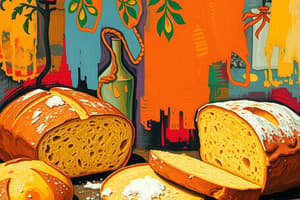Podcast
Questions and Answers
What are quick breads?
What are quick breads?
- Leavened by chemical agents or air/steam (correct)
- Longer to prepare
- Batter or dough (correct)
- Leavened by yeast
What distinguishes yeast breads from quick breads?
What distinguishes yeast breads from quick breads?
- Quicker to prepare
- Leavened by chemical agents
- Leavened by yeast (correct)
- Dough is thicker
What is the ratio for pour batter?
What is the ratio for pour batter?
- 1 part liquid: 3 parts flour
- 1 part liquid: 2 parts flour
- 2/3-1 part liquid: 1 part flour (correct)
- 1 part liquid: 6-8 parts flour
What is the consistency of drop batter?
What is the consistency of drop batter?
What is the purpose of mixing batter and dough?
What is the purpose of mixing batter and dough?
How should batters be mixed?
How should batters be mixed?
What is the main requirement for kneading doughs?
What is the main requirement for kneading doughs?
Why do most baked products contain flour?
Why do most baked products contain flour?
What kind of gluten does wheat flour contain?
What kind of gluten does wheat flour contain?
Name some examples of gluten-free flours.
Name some examples of gluten-free flours.
Over-manipulation of dough does not cause toughness.
Over-manipulation of dough does not cause toughness.
Most baked goods contain eggs because they provide flavor.
Most baked goods contain eggs because they provide flavor.
Why is salt added to dough and batters?
Why is salt added to dough and batters?
What can too much sugar in dough affect?
What can too much sugar in dough affect?
What is a common leavening agent used in baked goods?
What is a common leavening agent used in baked goods?
Flashcards are hidden until you start studying
Study Notes
Quick Breads
- Made quickly, leavened by chemical agents or air/steam.
- Common examples include muffins and pancakes.
Yeast Breads
- Require more time to prepare, leavened by yeast or starters.
- Examples include loaves and rolls.
Batters
- Pour Batter: Consists of 2/3-1 part liquid to 1 part flour; used for waffles and shortened cakes.
- Drop Batter: Comprises 1 part liquid to 2 parts flour; typical in muffins and cookies.
- Soft Dough: Contains 1 part liquid to 3 parts flour; used for biscuits and yeast breads.
- Stiff Dough: Features 1 part liquid to 6-8 parts flour; found in pie crusts and some cookies.
Mixing Techniques
- Mixing batters involves beating or stirring to hydrate flour without developing gluten.
- Kneading is essential for dough, promoting gluten development for structure.
Importance of Flour
- Flour is vital for structure, texture, and flavor in baked products.
- Starch and gluten contribute to crumb and elasticity, respectively.
Gluten Content in Flours
- Wheat Flour: Contains gluten.
- Rye: Contains gliadin and glutenin but forms less gluten.
- Barley, Triticale, and Oats: Contains varying gluten levels; oats have avenin, which may be safe for some with celiac.
Gluten-Free Alternatives
- Examples include arrowroot, buckwheat, legume flours, millet, and quinoa.
Dough and Batter Manipulation
- Over-manipulation of dough leads to toughness due to excessive gluten development.
- Over-manipulation of batters can introduce unwanted air pockets but doesn't significantly affect gluten.
Flour Weight and Sifting
- Sifted flour is lighter than unsifted flour.
Role of Liquid in Batters/Dough
- Liquid hydrates starch/gluten, dissolves sugars and leavening agents, and produces steam for leavening.
Leavening Agents
- Include gases (air, steam, CO2), chemicals (baking soda, baking powder), and biological processes (yeast).
Function of Eggs in Baking
- Eggs provide color, structure, flavor, and help emulsify fat and liquid.
Function of Fat in Baking
- Fat tenderizes by shortening gluten strands, contributes to flakiness, and helps retain moisture in baked goods.
Types of Fats and Their Properties
- Solid fats (SFA) result in flakiness but are less tender.
- Liquid fats (PUFA) yield tenderness but less flakiness.
Substituting Oils for Fats
- To substitute oil for fat in dough, chill the oil and use 7/8 cup of oil for every cup of fat.
Reduced Fat Products in Baking
- Cannot be used as substitutes due to higher moisture content.
Function of Salt
- Salt enhances flavor, competes for water, increases tenderness, regulates fermentation, and allows gluten to stretch.
Role of Sugar
- Sugar adds sweetness, tenderizes by competing for water, elevates starch gelatinization, and acts as food for yeast.
Leavening Agent Mechanisms
- Air: Introduced through techniques like creaming and beating.
- Steam: Requires high water content and oven temperature, essential in making pastries.
- Carbon Dioxide: Produced during fermentation and chemical reactions, critical for leavening.
Studying That Suits You
Use AI to generate personalized quizzes and flashcards to suit your learning preferences.



